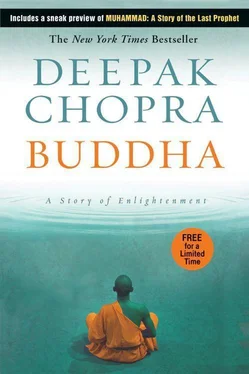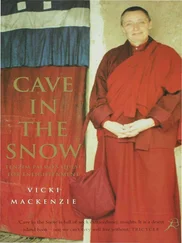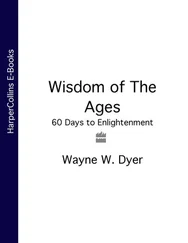“I didn’t come here to harm you,” said Gautama. “I no longer believe in the higher self. I wish that I could. But it seems nothing more than a fine phrase or an ideal no one ever attains. You are good and wise, but you became so by study-isn’t it the lower self that reads the Vedas?”
These words, intended to be mild, had the opposite effect. Alara hurled a scroll at Gautama’s head, then jumped to his feet, looking for a stick.
“Get out, scoundrel!”
Gautama longed to say, “Who is so angry with me right now? Your higher self?” But Alara’s eyes were bulging already. Gautama backed away quickly.
For weeks he had wandered on until he found Udaka, his next teacher. Udaka wasn’t a philosopher but a pure yogi, devoting his every moment to achieving divine union. Because he sat in silence most of the day, Udaka felt more like the forest hermit, yet he fathered the bikkhus around him every night and spoke.
“Some of you are new here, some have traveled with me for years. Which of you has met God?” he asked. A few of the older bikkhus, after some hesitation, raised their hands.
“You new ones, look around and pay attention. See those with their hands up? They are the greatest fools, and you must never listen to them,” said Udaka. Somebody gave a sharp laugh; the older bikkhus stirred uncomfortably.
“How can you meet God when God is invisible and ever-present?” Udaka asked. “If He is everywhere, you cannot meet God, and you cannot leave Him, either. So how many of you are seeking God right now, with all your hearts?”
This time a great many of the men sitting around the campfire raised their hands. “Take a close look at yourselves,” said Udaka. “You too are fools. I just told you that God is everywhere. How can you seek what is already here? If someone came up to you and said, ‘A thousand pardons, sir, but I am seeking this mysterious thing called air. Can you tell me where it is?’ you would mark him down as a fool, wouldn’t you? Yet you follow like sheep somebody’s word who told you that you must seek God.”
What Udaka taught instead was redeeming the soul, or atman. “Your soul is just as invisible as God, but it belongs to you. It’s your divine spark, hidden and disguised by restless desires. Your atman is always watching you, but you do not notice it. You notice your next meal, your next argument, your next fear. It is always drawing you closer to the divine, but you do not heed it. You heed a thousand desires instead. Be still and know your soul. Seek it, and when you meet your soul, seize it for yourself, because it’s worth far more than gold.”
Gautama, who had been disillusioned by the higher self, felt a sympathy for this new teaching. For one thing, it gave him time in seclusion, where he could meditate and sit in the cool silence that he considered his real home. Udaka knew that the other bikkhus held the new arrival in awe; they vied to sit next to Gautama because his mere presence deepened their meditations. The guru put Gautama on his right hand when the group next sat together, and this unspoken gesture was enough to raise him above even the most senior monks, who were not so holy that they enjoyed being displaced.
“Let them hate you, let them love you. It’s all a waste of time,” Udaka said indifferently. Gautama believed him. He’d grown up in a world torn apart by worse things than petty jealousy in an ashram.
“But if another monk hates me,” asked Gautama, “why can’t he see that he is being distracted from his purpose?”
“He might. His soul could send him a message,” Udaka said.
“But not always? He could go on hating me a long time, then.”
“Yes.”
Gautama felt a disquiet. “But if the soul is always loving, why doesn’t it tell him immediately not to hate me? What reason does it have to hold back?”
“You’re asking me to be wiser than the soul,” said Udaka, with a trace of irritation. “Don’t be so clever. I’ve never seen anyone think their way to heaven.”
Now Gautama knew what his disquiet was about. He had lost the forest hermit and Alara. If he kept on this way, Udaka would fall away next. Disciples without masters are like fallow fields where no rain falls. He couldn’t do without nourishment. Udaka knew this too; he gave Gautama a hard look. “You have something more to say? Perhaps you want to ask me about humility.”
“No.” Gautama kept his composure. “I wanted to tell you that I’ve been having a vision. My wife comes to me. She says that I deserve compassion. Can you tell me what that means?”
“Ignore it.”
Udaka said this without the slightest sign that he cared about such things. Gautama wouldn’t be put off, however.
“Master,” he said, “many of the disciples have left homes and women they love. Their children are forgetting their father’s face. Can’t a devoted wife be part of my soul?”
“No one belongs in your soul but you,” said Udaka.
“Then perhaps her image is a message. You said that the soul sends messages.”
“But it doesn’t send dreams. She’s the figment of an ignorant mind,” Udaka said curtly. “What if you caught a cold? Would you want me to tell you what the soul means when it sends you a cold? Get over her as you would get over any other disease.” Gautama’s master had never been married, and like many yogis he made a sour face whenever women were mentioned. Udaka’s revulsion bothered Gautama. Does he imagine that women have no souls? But the discussion was over. Gautama bowed and left without another word.
That night he returned to his tent, where he found Ganaka sitting up eating a bowl of millet gruel. “Why so worried, saint?” asked Ganaka, looking up.
“You must be feeling better.”
“Much.” Ganaka began slurping the last bit of gruel from the bowl. “I should be strong enough in the morning to leave.”
“Where will you go?” asked Gautama.
“Deeper into the jungle. I don’t intend to be found a second time.”
Gautama was shocked. “You’re going to try to kill yourself again?”
“Of course. It’s my Dharma.” Ganaka looked perfectly calm and serious, speaking without a trace of cynicism. “Strange, isn’t it? I have to eat to get the strength to go out and starve myself.”
“I can’t let you,” Gautama blurted out. He was so shaken that he wanted to pace back and forth. Instead, he forced himself to sit on the ground with his hands folded in his lap. His heart pounded.
Ganaka said, “There are two things even a saint can’t stop. One is being born, and the other is dying.” He waited for Gautama to protest. It was hard to miss who in the tent was calmer and more collected.
“Killing yourself is a sin,” said Gautama, then he stopped himself. Ganaka wasn’t a fool or ignorant of scripture. “Please explain what you mean,” Gautama said.
Ganaka burst out laughing. “Excuse me, but I just can’t help myself, little saint. Look at you. You wanted to jump out of your skin when I told you what I’m going to do. But you didn’t. Oh, no, you controlled yourself. You know how a holy man acts, and I must say you’ve gotten it down. I wish I could train a monkey half as well.”
Gautama felt the heat creeping up his face. “That’s unfair.”
“Who cares? I’m going to die tomorrow. I can say what I want.” The strange thing is that Ganaka wasn’t speaking harshly; his tone toward Gautama was almost kind. “I once told you that you reminded me of my younger self. Has it occurred to you yet that I might be your older self?” Seeing the scowl that Gautama was trying not to show, Ganaka broke out into laughter again. “You’re like a traveling show. I can see at least five or six people fighting inside you. Quite a spectacle.”
Читать дальше












